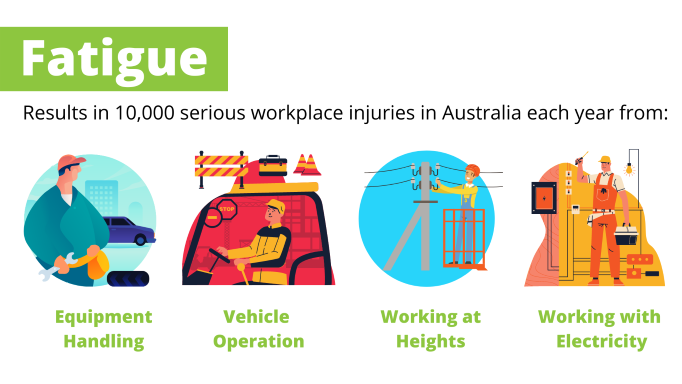The culture we live in is one where we continually push our bodies and minds to the limit. To suppress our natural impulses to sleep, we consume stimulants like sugar, caffeine; to keep up with our circadian rhythms, we spend evenings glued to screens; to stay fit and good, we exercise; to stay healthy, we eat healthily.
The amount of information we are exposed to in a day is much greater than what our ancestors experienced in a lifetime; we subscribe to a culture of overwork in which long hours and constant exhaustion are lauded as markers of success. At some point, something has to give. Neglecting our needs for rest and recovery virtually ensures the onset of fatigue.
What is Fatigue?
Tiredness and drowsiness, however, aren’t the only symptoms of fatigue, according to Safe Work Australia. Fatigue happens when we push too hard for too long without easily recovering. An individual who is fatigued is unable to perform their work safely and effectively due to mental and/or physical exhaustion.
An individual suffering from fatigue may have tiredness that persists even after sleep, slow reflexes, problems with short-term memory, inability to concentrate, blurry vision or impaired visual perception, and the need for extended sleep on days off from work. Additionally, fatigued individuals may experience muscle weakness or pain, anxiety, mood swings, headaches, dizziness, and hallucinations.
Dangers of fatigue
The vast majority of people would never consider driving while intoxicated. But did you know that someone who drives after being awake for 17 hours faces the same risk of crashing as a driver with a blood-alcohol level above the legal limit? On country roads, one in four accidents that involve only one vehicle are caused by drowsy drivers. Fatigued driving accounts for 10 to 30 percent of all car accidents in Australia.
When employees and those around them are fatigued at work, they are at a greater risk of injury or death. Fatigue is especially dangerous when operating a fixed or mobile plant, driving a vehicle, working at heights, taking part in medical procedures or surgery, working with flammable or explosive substances, or undertaking electrical work.

What causes fatigue?
Although fatigue is often attributed to the hectic pace of modern life, it can also be triggered by underlying medical issues, lifestyle factors, workplace challenges, and mental health issues. In addition to medical causes such as thyroid disorders or heart disease, lifestyle factors may include drugs, alcohol, food, lack of exercise, and sleep disturbances.
Among the reasons for fatigue at work include shift work, long hours, excessive noise and temperature changes, interpersonal conflicts (bullying, conflict with colleagues), and a lack of work-life balance. Many psychological factors like anxiety, stress and, depressive disorders also contribute to fatigue.
Our focus on safety
We have over 10 years’ worth of experience in the construction and hospitality staffing industry, we have branched out and now cover health care and IT as well. We know the ins and outs of the business and through years of hard work, we have developed a deep commitment and dedication to help our stakeholders achieve their goals and objectives.
Our loyal customer base has grown with us over the years, and we owe it to them and to the rest of the players in the industry, to keep improving.
We ensure that all our representatives have all the required training and experience to complete the job in hand. We carry out all the mandatory procedures to ensure our employees are working in a safe environment and adhering to the site rules.
There are many labour hire companies in Sydney. But with Casuals On The Move, you get the best in town with peace of mind. Get in touch today to find out more about how we can assist your business, call (02) 9517-4726



